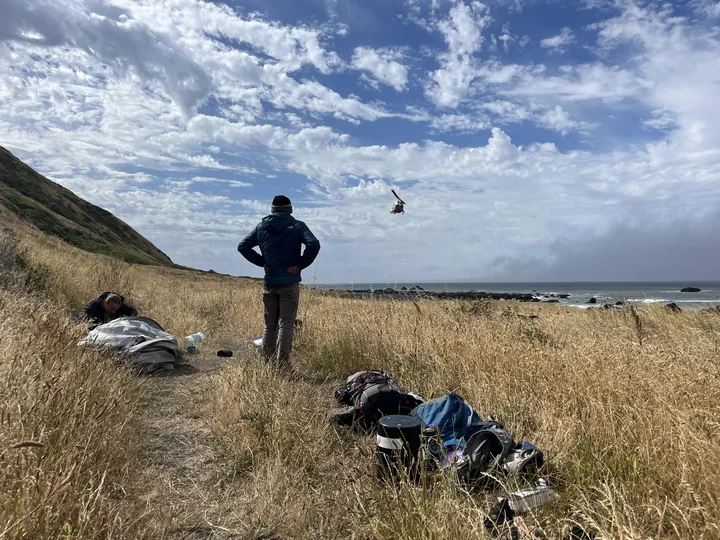Lost Coast Camp counselors Solomon Reinman and Jack Davis with the injured man, under the tarp, as a CalFire rescue helicopter descends. Photo: Maria Vollmar
A middle-aged man was rescued by helicopter after a group of six teen hikers and two summer camp counselors found him – severely injured, unable to walk and exposed to the elements – along the Lost Coast Trail on Tuesday morning.
The solo hiker was lying in the trail near Punta Gorda Lighthouse when the group found him around 9 a.m. He was covered in blood and shivering violently, said Maria Vollmar, who is the program director for Lost Coast Camp, a Petrolia-based summer camp that organized the trip. Vollmar, who had dropped the group off at the trailhead earlier that morning, ran to meet them after learning of the emergency via satellite phone.
By the time she arrived, the group’s two counselors – Solomon Reinman, 26, and Jack Davis, 28 – had stabilized the hiker. The two are wilderness first-aid certified and knew what to do. After calling for a helicopter rescue by satellite phone, they cut open the man’s jacket and dressed the deep cuts on his arms, then wrapped him in a sleeping bag and covered him with a tarp. The hiker was conscious but could not remember what had happened to him or how long he had been there. Although he was found above the high tide line, the man was slightly wet, Vollmar said.
Meanwhile, the teens, who are all boys ranging from 12 to 15 years old, hung back and remained calm. “The campers had all gotten a brief first-aid training from the [Petrolia Volunteer Fire Department] the day before, so they were aware of what was going on,” Vollmar, who is 27, told the Outpost over the phone. When Vollmar arrived, she and the teens pulled out their camping stoves to make hot water bottles, which they put under the tarp with the hiker to warm him up.
“The campers were all just really, really helpful and steady and kind,” Vollmar said. “Sol and Jack just really did an amazing job helping this man.”
A CalFire helicopter arrived about 90 minutes after the call, Vollmar said.
Jeremy Ward, a Fire Captain at CalFire, said that the helicopter was able to land on the ground near the hikers.
“The male was hypothermic, he was disoriented and had some cuts to his torso,” Ward said. Responders “transported him via air to Eel River heli-base in Redway, and from there he was ground transported by an ambulance to the nearest medical facility.”
Ward didn’t have any more information about the man’s current status.
After the hiker was airlifted away, Vollmar, Reinman and Davis sat down with the campers to talk about what had happened.
“They all expressed a lot of gratitude for us having first-aid certification and training to be able to handle the situation,” Vollmar said. “They felt really safe, and they felt really grateful for the training from the fire department so that they were kind of clued in to what was going on and why.”
Lost Coast Camp requires that every trip leader is wilderness first-aid certified, Vollmar said, but they’ve never dealt with an injury more severe than a sprain or heat stroke since the organization was founded in 1997.
“Just seeing how well everyone was able to respond under pressure was really inspiring, for the skill of our staff,” Vollmar said.
Because they were down a sleeping bag, the group hiked out, regrouped and reentered the trail yesterday evening.
They are on a multi-day backpacking trip from Mattole Beach to Black Sands Beach near Shelter Cove, a popular 25-mile stretch of the Lost Coast Trail in the King Range National Conservation Area. Walking mostly along the shore, hikers must carefully plan around high tides that are sometimes impassable. The area is considered somewhat dangerous; one person drowned and another injured after the two were swept out to sea at Black Sands Beach a couple of years ago.
Vollmar and Ward both cautioned safety to those who brave the wilderness.
The injured hiker told his rescuers that this was his first backpacking trip, Vollmar said. “We highly recommend that anyone going backpacking for the first time go with a friend, and highly recommend having first-aid training if you’re going to be on the trail.”
Ward said that CalFire responds to emergencies in the area several times a year, from lost or stranded hikers to vegetation fires.
“We would advise folks that if they are hiking into these really remote areas, there are some satellite communications devices that people can get, they’re becoming more affordable,” he said.
“At the very least, I would reach out to some friends or family and let them know specifically where you’re going and when they can expect you to check back in.”

CLICK TO MANAGE